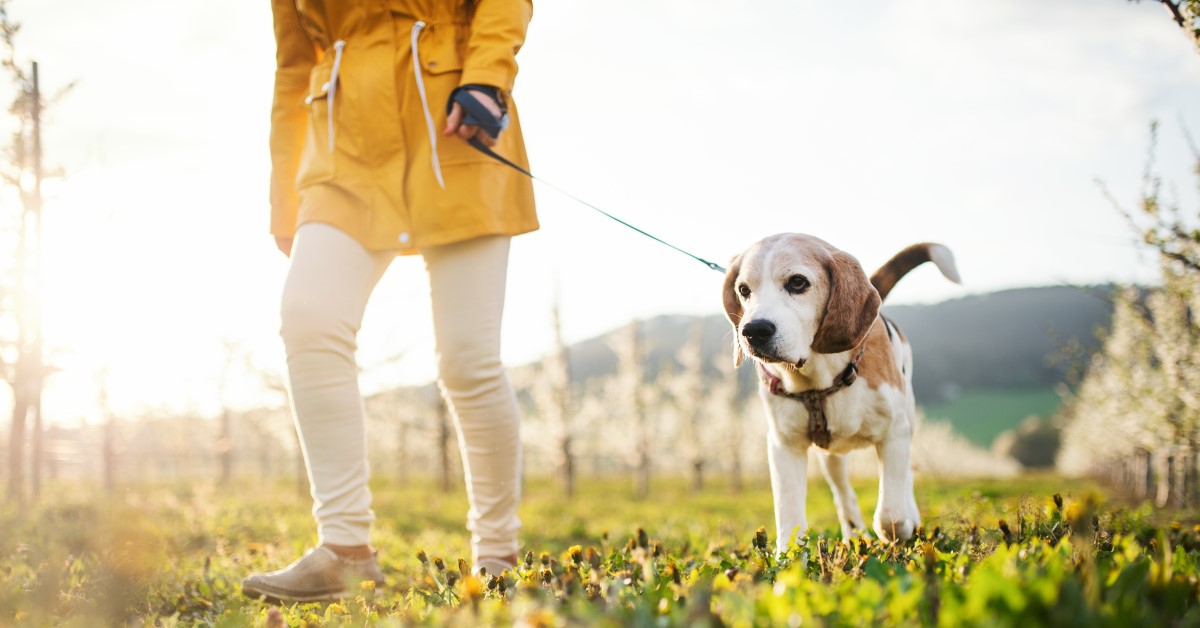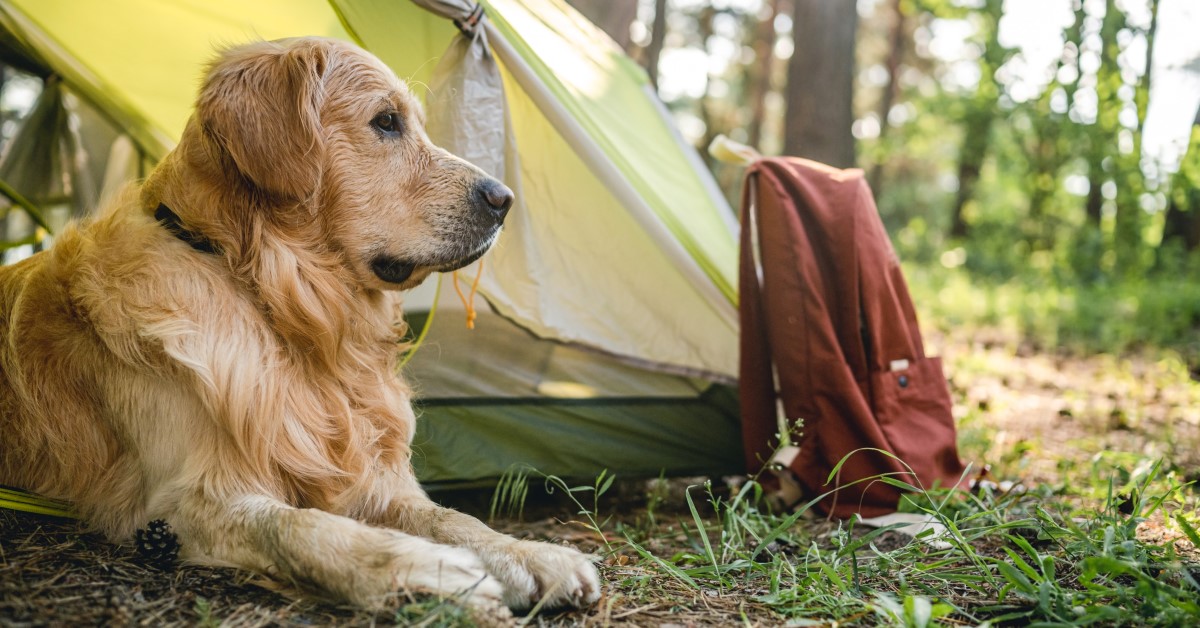Springtime Safety Tips for Dogs
It's spring and everyone delights in shaking off the cobwebs of winter, which means cleaning up in the yard and the house. For your canine friend, toxins and dangers abound, including chocolate,some plants, and the very dangerous sugar-free sweetener, xylitol, all of which lurk as very serious threats. Canine coughs and sneezes herald the start of allergy season, and once again, it's time for flea and tick prevention.

“The world is mud-luscious and puddle-wonderful,” goes the poem by e.e.cummings.
You may have spring fever, but that’s not an excuse for overlooking the antics your favorite canine companion may be getting into. Along with the intoxicating springtime is the need to keep your dog safe and in good health. The following recommendations will help you keep your pet well-protected indoors and out.
Springtime Food Celebrations
If you have young children and celebrate Easter, chances are there will be an abundance of candy in your home and much of this is chocolate. When you are not looking, your dog may find his way into your child’s Easter basket, which probably means a visit to your vet.
Chocolate is extremely dangerous for both dogs and cats with dark chocolate the most harmful. Additionally, more and more candy is being made with an artificial sweetener called xylitol, which is also extremely dangerous for dogs. Chances are high that candy labeled sugar-free may contain this toxic additive.
Also, don’t disregard candy wrappings that dogs can also ingest. Typical wrappings include tinfoil, paper and decorative ornaments. Dogs are also attracted to inedible items including fake grass, plastic eggs, and small toys. Stuffed rabbits and other toys may be part of the Easter parade of goodies that provide your dog with the tempting challenges of tearing, chewing, and swallowing their fluffy innards.
Unpeeled hard boiled eggs are another edible that can cause serious intestinal trouble for your dog. For some reason, dogs find these irresistible despite their potential to cause choking or digestive harm.
The bottom line with Easter baskets is to store them up high, and away from curious canines.
Other rites of spring that involve food include Mother’s Day, graduations, recitals, and end-of-school celebrations. Keep a watchful eye on your pet whenever there are potentially risky foods and groups of people around.
Garden and Yard Dangers
The springtime yard is fresh and full of sprouting plants and flowers. This season of new growth is filled with hope and wonder, but it could also be full of danger for your dog.
Some spring plants and blooms are toxic to your dog and can cause vomiting, diarrhea and excess salivation if eaten. These flower blooms include tulips, hyacinths, and irises. Every part of these plants is toxic, but the most potent poison is in the bulbs.
The crocus plant is also harmful to dogs, but it has two seasonal versions: one that blooms in spring and one in the fall. The spring crocus causes similar symptoms to tulips, hyacinths, and irises if ingested, but the fall version is much more dangerous and can cause liver, kidney, or even bone marrow damage.
Daffodil bulbs also contain toxins that cause gastrointestinal symptoms, plus, they cause additional symptoms that include depression and possibly even seizures.
Another garden worry is toxic fertilizers that can seriously poison your dog. If you fertilize your lawn, keep your dog off it and ideally use pet-safe fertilizers. Also, keep your dog off neighbors’ lawns that you either know or suspect have been treated with toxic fertilizer.
Spring Cleaning
Spring is the season when many people pull furniture out from the wall, scour floors and bathrooms, wash windows, and clean curtains and draperies. It’s wonderful to have a home that sparkles and smells fresh, but it’s not so wonderful if your cleaning materials are toxic and your dog has found a way into your bucket of soapy water, or worse, chewed his way through the plastic of an especially poisonous agent.
Take special care in looking for cleaning products. Avoid those that are labeled “natural” as they may still contain harmful ingredients. Instead, buy those labeled “pet friendly.” Another option would be to make your own cleaners with vinegar and water, baking soda, and lemon juice.
Exercise Injuries
The snow has melted, the sun is shining, and the lure of the fresh outdoors is irresistible. You and your dog take off for your first strenuous run of the season, only your run doesn’t last long because suddenly he comes up limping. This is called too much, too soon. Just as you should gradually work up to your optimum exercise threshold for your heart and muscles, you should also make sure your pup is in shape.
Allergies
Along with the welcome budding of trees, grass, and plants, as well as accompanying weather changes, comes the unwelcome start of the allergy season. Your canine friend can suffer just as much, if not more, than you. His allergy symptoms include sneezing, runny nose, itchy eyes, rashes, hives, and skin changes. When severe, allergies can also cause difficulty breathing. Finding the culprit is a slow matter of eliminating exposure to potential sources one at a time. In the meantime, your vet can prescribe medication to help eliminate his symptoms.
Fleas and Ticks
The reality is that ticks survive through the winter and are raring to go come spring. Now that outdoor season is here, it’s important to make sure your dog has proper flea and tick prevention.
Lawn Cleanup
Believe it or not, the usual lawn cleanup ritual can be dangerous for your dog. During the howling winds of winter, trees lose branches and sticks, which are irresistible playthings for dogs. Do avoid tossing sticks for your dog to fetch as they can break off into small pieces and splinters that can cause choking. Also, keep an eye on your pet as he may decide to play his own game with errant backyard sticks. Stones can be another source of potential danger for choking or intestinal blockages.
Spring is a wonderful, exciting, and magical time of year, and in your exhilaration of shaking off the dust of winter, it may be easy to overlook the hazards the season may hold for your dog. Do enjoy, but do everything you can to make sure your dog will safely enjoy the season too.
Ready to start saving money on pet wellness care?
Then take a look at Mint Wellness, the pet wellness plan that provides fast reimbursement on routine pet care. Save on vaccinations, wellness exams, preventatives, dental, and more!
Learn More


